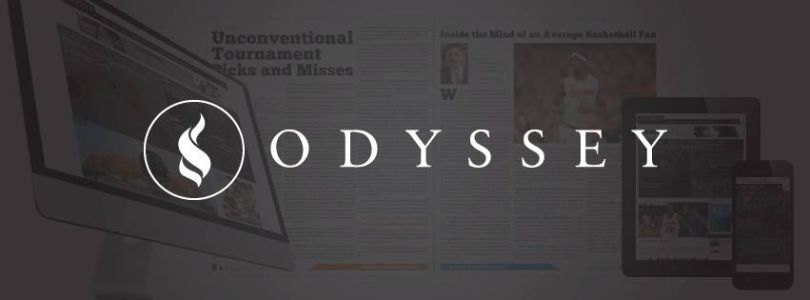Digital media is here to stay. Over the past few years, old-school journalism institutions have been focused on innovation, media companies have invested heavily tech and the industry is becoming more data-driven as a whole.
In New York, the long-standing media capital of world, this digital shift is more pervasive than ever, as we’ve seen digital media companies pop up again, again and again. But among the many online publishers that crowd the internet, it’s difficult to stand out and innovate as a digital media brand. We caught up with three New York startups that are doing just that, and subsequently working to shape the future of media as they go.

 LittleThings is a digitally native lifestyle brand that share uplifting stories. We caught up with Maia McCann, the company's Editor-in-Chief.
LittleThings is a digitally native lifestyle brand that share uplifting stories. We caught up with Maia McCann, the company's Editor-in-Chief.
Built In: How has LittleThings adhered to media's shift into a digital industry?
Maia McCann: Our mission is to share joy and positivity, and content that is positive outperforms content that is negative. So what we’ve been able to do is grow exponentially over the course of two years. We started out as a small team of writers and now we’re taking up two floors of a building and outgrowing our space quickly.
BI: How do you differentiate yourself within the digital media space?
MM: LittleThings’ founding mission is simply to make people happy and cater to an underserved audience — that audience is women who are 35 and over. There’s a lot of competition in digital media among millennial audiences and we’re different in that our audience is older. There are a lot of mothers in our audience, and they like to share feel-good, inspiring content.
BI: How do you think media is shifting to an older generation that is online?
MM: More niche sites are popping up on the Internet. Now, what you’re seeing is that websites do content specifically for moms, or women over 40 years old and you’re seeing more nostalgia on the Internet.
BI: What projects is your company working on that are conducive to the future of media?
MM: We’re experimenting with lots of video content. For example, we are launching a series that features four-minute cooking recipes and is hosted exclusively by grandmothers. While there’s a lot of digital sites that curate content, we’re producing it in house. When we launched, we were really small and focused a lot on curation. We would find videos that we thought would resonate with your audience, we’d write them up then we’d post them. Now we’ve shifted into being creators — within the past year we went from producing five videos per week to 25 videos per week, along with live podcasts each week.

 Odyssey uses proprietary technology to allow users to create and discover compelling, high-quality content at speed and scale. We caught up with Lauri Baker, Odyssey's SVP of Sales and Marketing.
Odyssey uses proprietary technology to allow users to create and discover compelling, high-quality content at speed and scale. We caught up with Lauri Baker, Odyssey's SVP of Sales and Marketing.
Built In: How has Odyssey adhered to media's shift into a digital industry?
Lauri Baker: At Odyssey, we believe the world needs more ideas and broader perspectives to be heard, and that by disrupting the traditional editorial model and democratizing the process of content creation and discovery, we can elevate dialogue around the world. Launched in June 2014, Odyssey is a highly selective social content platform that combines the best of social networking — personal connection, grassroots energy, and the power to scale — with the best of publishing and journalism — long-form perspective, integrity and edited content, making news and conversation personal and more relevant.
BI: How does Odyssey envision the media industry in five years?
LB: The media industry has already seen a dramatic shift over the past five years as evidenced by the power of social media to drive publisher page views up or down. The reality is that we get our news from our social feeds, primarily through recommendations from friends. At Odyssey, we believe that relevance matters and by empowering a new generation of storytellers, we can amplify stories in ways that have never been done before.
BI: What projects is your company working on that are conducive to the future of media?
LB: Because we believe relevance also matters to the user, Odyssey has built a personalized user experience based on the people and ideas that matter most. Once a user comes back into the Odyssey platform, our proprietary technology, called our 'relevance engine,' allows for the discovery of new topics based on real-time trends and alternative perspectives. We believe that engagement should be measured in minutes, not seconds, and driven by the sharing of new ideas through an organic, peer-to-peer social platform.
BI: How has being located in NYC impacted Odyssey as a media company?
LB: Odyssey sits at the intersection of Madison Avenue advertising and Silicon Valley innovation, meaning that we meet where advertising, social media and technology engage. Being located in the heart of New York City allows us to mingle and converse with some of the biggest and brightest media and tech powerhouses across the industry. The thriving media landscape, prominent leaders, millennial innovators, and more are conducting business right here in the city, and that gives us the opportunity to insert ourselves into the vital industry conversations happening, and even more importantly, gives us a chance to start our own. Our team is constantly engaging through industry conferences, in-person media opportunities, and social networking events that allow us to stay on top of media’s ever-evolving shifts.
New York is unique in that it also exposes us to new people and networks that are completely dissimilar from our own industry, offering a completely different perspective and a new way to look at our business. In a way, New York serves as a microcosm for Odyssey itself — there’s always a chance for peer to peer engagement, high level networking and authentic conversation, as long as you’re open to it.

 Greatist is a next-generation company that caters to a healthy-minded audience, placing an emphasis on fitness, health and happiness content. We caught up with Derek Flanzraich, the company's CEO and Founder.
Greatist is a next-generation company that caters to a healthy-minded audience, placing an emphasis on fitness, health and happiness content. We caught up with Derek Flanzraich, the company's CEO and Founder.
Built In: How has Greatist adhered to media's shift into a digital industry?
Derek Flanzraich: Greatist has been around for five years and started with my personal frustration with my own weight. As a result, I wanted to make a product that provides trustworthy information on healthy living and would speak to an audience like a friend. I knew that the content in the health space wasn’t great, and I wanted to create something that covered health in a better way.
So I took a bet on writing great content in an authentic voice and using social media’s power to spread the word. Then, through content, we started building an audience, brand, voice and real relationship with people. Today we think of ourselves as a next generation media company that’s science-backed and expert approved.
BI: How has digital media changed over the past five years?
DF: In the era of broad based brands, the rise of niche, premium, relevant brands are just beginning. The most cost-effective form of marketing is content, and that’s why we started there. Great content goes a really long way. I think less about the platforms for sharing content and more about who we are trying to reach on those platforms, as who we’re trying to reach has gotten more and more narrow as we’ve gotten bigger.
BI: What are the primary ways you think you differentiate yourself from media companies?
DF: Every piece of our content is expert approved and science backed. But the real differentiator for us is voice — voice is the most underrated tactic in content and publishing. Greatist we spend a lot of time thinking about our voice, which fits into our mission to help people have a healthy attitude. We don’t pride ourselves about writing about a topic first, but pride ourselves on writing about a topic best.
Have a tip? Let us know or follow us on Twitter and LinkedIn.





